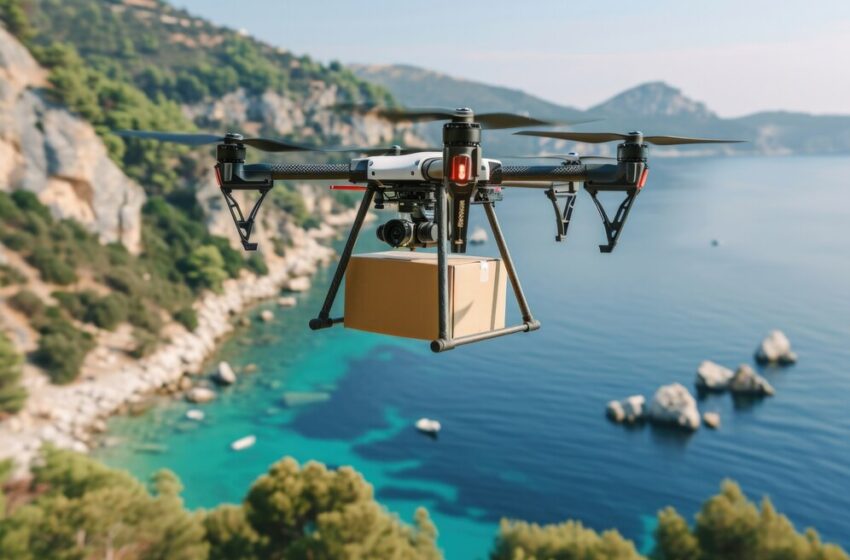The Future of Autonomous Drones in Logistics and Delivery Services

In the last decade, the logistics and delivery industry has witnessed a transformative wave brought about by technological innovations, among which autonomous drones stand out as a promising frontier. The potential of drones to revolutionize delivery services by enhancing efficiency, reducing costs, and increasing accessibility is immense. As we look towards the future, it’s clear that the role of autonomous drones in logistics and delivery services is not just promising but is poised to redefine how goods are transported across the globe.
Understanding Autonomous Drones
Before delving into their future roles, it’s essential to understand what autonomous drones are. Unlike traditional drones, which require manual operation, autonomous drones are equipped with advanced technologies that allow them to navigate and complete tasks with minimal human intervention. These drones use a combination of GPS, computer vision, AI, and machine learning algorithms to safely and efficiently navigate to their destinations.
The Current State of Drone Logistics
The use of drones in logistics is not entirely new. Several pioneering companies have launched pilot programs to explore the feasibility and benefits of drone delivery. For instance, in 2016, Amazon Prime Air announced its first successful drone delivery, marking a significant milestone in the industry. However, widespread adoption has been slow, primarily due to regulatory hurdles and safety concerns.
Future Prospects: A Sky Full of Drones
Regulatory Framework and Safety Measures
One of the primary challenges facing the expansion of drone logistics is the establishment of a comprehensive regulatory framework that ensures safety without stifying innovation. Governments and regulatory bodies worldwide are working towards creating guidelines that address safety, privacy, and security concerns. As these frameworks become more refined, we can expect a significant increase in drone delivery operations.
Technological Advancements
The future of autonomous drones in logistics is closely tied to advancements in technology. Improvements in battery life, payload capacity, and navigation systems will allow drones to cover longer distances, carry heavier loads, and operate with greater precision. Furthermore, the integration of AI and machine learning will enable drones to make real-time decisions, avoid obstacles, and optimize delivery routes.
Expanded Applications
While the current focus of drone logistics is on delivering small packages directly to consumers, the future will likely see a broader range of applications. Autonomous drones could play a crucial role in transporting medical supplies to remote or hard-to-reach areas, delivering emergency supplies during natural disasters, and even transporting goods between warehouses and distribution centers.
Economic and Environmental Impact
The adoption of drone technology in logistics and delivery services offers significant economic benefits. By reducing the reliance on traditional transportation methods, companies can lower their operational costs, decrease delivery times, and improve service quality. Moreover, drones, especially those powered by renewable energy sources, can significantly reduce the carbon footprint associated with the delivery of goods, contributing to more sustainable logistics practices.
Challenges and Considerations
While the benefits are clear, the widespread adoption of autonomous drones in logistics faces several challenges.
Regulatory Hurdles
One of the primary obstacles is the current regulatory environment. Governments and aviation authorities worldwide are grappling with how to integrate drones safely into national airspace. Issues such as privacy, security, and safety of both the drones and the public are under intense scrutiny. Establishing comprehensive regulatory frameworks that address these concerns without stifling innovation is crucial for the future of drone logistics.
Technological Barriers
Technological advancements have paved the way for autonomous drones, but there remain significant hurdles. Ensuring reliable navigation in diverse weather conditions, enhancing battery life for longer flights, and developing sophisticated collision-avoidance systems are among the key challenges that researchers and companies are working to overcome.
Public Perception and Acceptance
Another challenge is public perception. Concerns over privacy, noise pollution, and safety could hinder the acceptance of drone delivery services. Transparent communication and community engagement are essential in building trust and demonstrating the benefits of drone technology to the wider public.
Final Verdict
The future of autonomous drones in logistics and delivery services is not just bright; it’s inevitable. As technology advances and regulatory frameworks evolve, drones are set to become an integral part of the logistics ecosystem. Their ability to enhance efficiency, reduce costs, and minimize environmental impact positions them as a key player in the future of delivery services.
However, realizing this potential will require overcoming current challenges and ensuring that drone logistics develop in a safe, responsible, and inclusive manner. The journey ahead is exciting, and the sky is the limit for autonomous drones in logistics and delivery services.(Nominate Now: Join us to spotlight your achievements! Be part of the elite in the business and finance community. Exciting opportunities await!)






